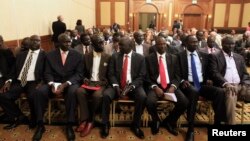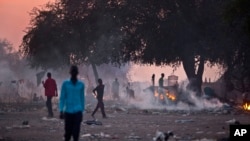South Sudan's warring factions have opened peace talks in Ethiopia, as violence continues in at least two regions of South Sudan, with government troops advancing on Bor, the rebel-held capital of Jonglei state.
Representatives for President Salva Kiir and ex-vice president Riek Machar took part in opening ceremonies for talks on Saturday.
Ethiopian Foreign Ministry spokesman Dina Mufti said the two sides would begin face-to-face negotiations in Addis Ababa on Sunday, following days of delays.
Mufti said several items would be high on the agenda.
"Definitely cease-fire will be on the top of agenda, then the issue of opening humanitarian corridors, the issue of releasing detainees and other issues," he said.
Mufti said negotiators were anxious to find a resolution to the fighting, which has left more than 1,000 people dead.
"All sides are feeling the need, the urgency, for a cease-fire and everything else," he said.
U.S. Secretary of State John Kerry said Sunday that Washington would support those seeking peace, but would work for international pressure against those who used force to gain any advantage. Kerry said negotiations must be serious - not a "gimmick."
South Sudan's unrest began in mid-December, when renegade soldiers attacked an army headquarters. President Kiir accused former vice president Machar of a coup attempt.
On Saturday, there were reports of heavy fighting near Bor, the rebel-held capital of Jonglei state, which government troops have launched an effort to reclaim.
Earlier, forces loyal to Machar said they were preparing to advance from Bor to the national capital, Juba. But in a Friday interview with Britain's Telegraph, Machar said his forces would hold back on attacking the capital in hopes of achieving a "negotiated settlement."
The French News Agency said explosions and automatic artillery fire rattled a government district in the capital on Saturday.
The talks in Ethiopia are being mediated by the Intergovernmental Authority on Development (IGAD), an East African regional bloc.
Story continues below photo gallery
EU Horn of Africa representative Alexander Rondos, who is at the meeting, said the responsibility to find a solution to the conflict rested in the hands of South Sudan's political leadership.
"The leadership of South Sudan, the entire political leadership, needs to find a resolution," he said. "there are no alibis, only they can find that solution. And they must do everything to help the negotiators from IGAD to find that solution and very quickly," he said.
Machar said Wednesday that President Kiir was responsible for much of the unrest. He said peace could not be achieved under the president's leadership.
Witnesses said some of the violence was ethnically motivated, with supporters of Kiir, a member of the Dinka tribe, and supporters of Machar, from the Nuer tribe, targeting each other.
Some information for this report was provided by AFP and Reuters.
Representatives for President Salva Kiir and ex-vice president Riek Machar took part in opening ceremonies for talks on Saturday.
Ethiopian Foreign Ministry spokesman Dina Mufti said the two sides would begin face-to-face negotiations in Addis Ababa on Sunday, following days of delays.
Mufti said several items would be high on the agenda.
"Definitely cease-fire will be on the top of agenda, then the issue of opening humanitarian corridors, the issue of releasing detainees and other issues," he said.
Mufti said negotiators were anxious to find a resolution to the fighting, which has left more than 1,000 people dead.
"All sides are feeling the need, the urgency, for a cease-fire and everything else," he said.
U.S. Secretary of State John Kerry said Sunday that Washington would support those seeking peace, but would work for international pressure against those who used force to gain any advantage. Kerry said negotiations must be serious - not a "gimmick."
South Sudan's unrest began in mid-December, when renegade soldiers attacked an army headquarters. President Kiir accused former vice president Machar of a coup attempt.
On Saturday, there were reports of heavy fighting near Bor, the rebel-held capital of Jonglei state, which government troops have launched an effort to reclaim.
Earlier, forces loyal to Machar said they were preparing to advance from Bor to the national capital, Juba. But in a Friday interview with Britain's Telegraph, Machar said his forces would hold back on attacking the capital in hopes of achieving a "negotiated settlement."
The French News Agency said explosions and automatic artillery fire rattled a government district in the capital on Saturday.
The talks in Ethiopia are being mediated by the Intergovernmental Authority on Development (IGAD), an East African regional bloc.
Story continues below photo gallery
EU Horn of Africa representative Alexander Rondos, who is at the meeting, said the responsibility to find a solution to the conflict rested in the hands of South Sudan's political leadership.
"The leadership of South Sudan, the entire political leadership, needs to find a resolution," he said. "there are no alibis, only they can find that solution. And they must do everything to help the negotiators from IGAD to find that solution and very quickly," he said.
Machar said Wednesday that President Kiir was responsible for much of the unrest. He said peace could not be achieved under the president's leadership.
Witnesses said some of the violence was ethnically motivated, with supporters of Kiir, a member of the Dinka tribe, and supporters of Machar, from the Nuer tribe, targeting each other.
Some information for this report was provided by AFP and Reuters.






